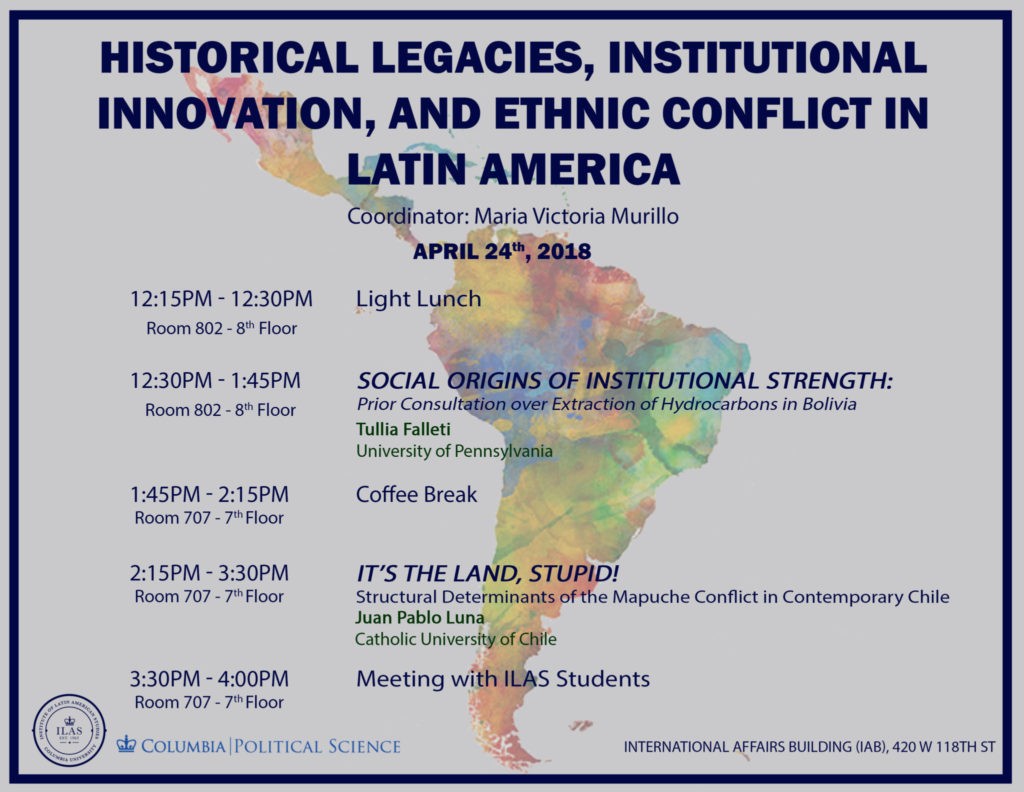Historical Legacies, Institutional Innovation, and Ethnic Conflict in Latin America

Tulia G. Falleti is the Class of 1965 Term Associate Professor of Political Science, Director of the Latin American and Latino Studies Program, and Senior Fellow of the Leonard Davis Institute for Health Economics at the University of Pennsylvania. She is the author of Decentralization and Subnational Politics in Latin America (Cambridge University Press, 2010), which earned the Donna Lee Van Cott Award to the best book on political institutions by the Latin American Studies Association. She is co-editor, with Orfeo Fioretos and Adam Sheingate, of The Oxford Handbook of Historical Institutionalism (Oxford University Press, 2016), among other edited books. Her articles on decentralization, federalism, authoritarianism, and qualitative methods have appeared in edited volumes and journals such as the American Political Science Review, Comparative Political Studies, Publius, Studies in Comparative International Development, and Qualitative Sociology, among others. Falleti is working on a book on civic engagement in Latin America.
Juan Pablo Luna is a Professor Political Science at Instituto de Ciencia Política, PUC-Chile and Principal Investigator in the Millenium Nucleus for the Study of Stateness and Democracy in Latin America. His books include Latin American Party Systems (with Herbert Kitschelt, Kirk Hawkins, Guillermo Rosas, and Elizabeth Zechmeister, CUP 2010), Segmented Representation: Political Party Strategies in Unequal Democracies (OUP 2014), and The Resilience of the Latin American Right (co-edited with Cristóbal Rovira, JHUP 2014). His research has also appeared in journals such as Politics and Society, the American Behavioral Scientist, theJournal of Politics, Democratization, Latin American Politics and Society, Electoral Studies, Comparative Political Studies, the Journal of Latin American Studies, Política y Gobierno, the Revista de Ciencia Política, Third World Quarterly, and the International Political Science Review. He is currently interested in the study of democratic institutions in Latin America, political representation, the interaction between organized crime and state agents, and the interaction between socioeconomic inequality, and relevant political outcomes. He has held visiting teaching positions at Princeton University (2008), Brown University (2011), Harvard University (2013), and Sciences Po (2014). He currently the Tinker Visiting Professor at the Institute of Lain American Studies, Columbia University, and serves as Associate Editor of Latin American Politics and Society and as co-editor of Cambridge’s Elements in Politics and Society in Latin America, andPalgrave’s Series on the Political Economy of Latin America. He has also co-founded REPAL (a research network on the political economy of Latin America).
